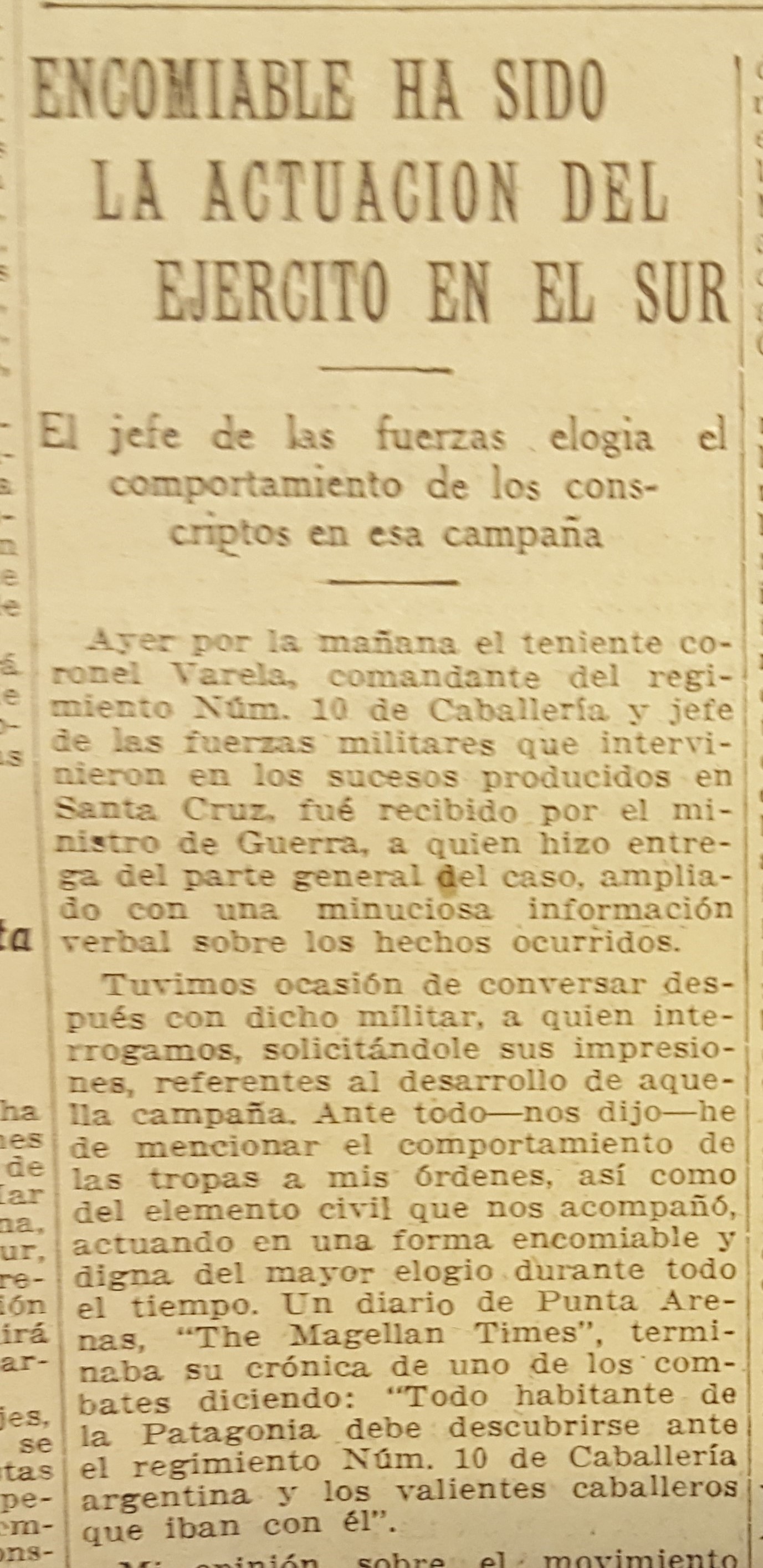Héctor Benigno Varela on:
[Wikipedia]
[Google]
[Amazon]
Héctor Benigno Varela (January 27, 1875 – January 27, 1923) was an
 For these events he was honored by the
For these events he was honored by the
Argentine
Argentines (mistakenly translated Argentineans in the past; in Spanish (masculine) or (feminine)) are people identified with the country of Argentina. This connection may be residential, legal, historical or cultural. For most Argentines, s ...
military officer, best known for having been responsible for the massacre of between 300 and 1,500 workers in the Santa Cruz province, during the events that became known as '' Patagonia Rebelde''.
Early life
Varela was born on January 27, 1875, in Renca, San Luis, son of Ramón S. Varela and Ramona Domínguez. He joined the San Martín Military College on February 19, 1895; then in December 1896 he started his military career in the 7th Cavalry Regiment. He then went on to the 3rd Regiment, where he was promoted to lieutenant in 1904. In 1919, Varela participated in the repression of workers' strikes during the Tragic Week, under the command ofLuis Dellepiane
General Luis J. Dellepiane (26 April 1865 – 14 August 1941), born in Buenos Aires, was a civil engineer, militarist and politician of Argentina.
With the title of Lieutenant General he participated in the politics linked to the Radical C ...
.
Patagonia rebelde
In November 1920, a rural workers' strike broke out in Santa Cruz, which went down in history as ''Patagonia Rebelde'' or ''Patagonia Tragica'' (''Rebel Patagonia'' or ''Tragic Patagonia''). Varela was appointed byHipólito Yrigoyen
Juan Hipólito del Sagrado Corazón de Jesús Yrigoyen (; 12 July 1852 – 3 July 1933) was an Argentine politician of the Radical Civic Union and two-time President of Argentina, who served his first term from 1916 to 1922 and his second ...
to try to smooth things out between the parties. After meeting with the strikers, an agreement was reached. However, when Varela withdrew from Patagonia, the ranchers did not comply and the strike began again as if there had been no agreement.
However, the government, being strongly criticized and accused of inaction by Santa Cruz landowners, conservative newspapers and embassies of foreign powers, sent Varela back to Santa Cruz with a force of 200 soldiers to violently repress the workers' movement. For more than a month Varela's troops persecuted the strikers, executing by firing squad most of them.
The event that best illustrates the criminal methods used by Varela was the torture and execution of José Font
José is a predominantly Spanish and Portuguese form of the given name Joseph. While spelled alike, this name is pronounced differently in each language: Spanish ; Portuguese (or ).
In French, the name ''José'', pronounced , is an old vernacul ...
, alias "Facón Grande", on December 23 by order of Varela himself, after he had assured him that he would respect his life if he surrendered peacefully.
 For these events he was honored by the
For these events he was honored by the nationalist
Nationalism is an idea and movement that holds that the nation should be congruent with the state. As a movement, nationalism tends to promote the interests of a particular nation (as in a group of people), Smith, Anthony. ''Nationalism: The ...
paramilitary group Argentine Patriotic League
The Argentine Patriotic League ( es, Liga Patriótica Argentina) was a ''Nacionalista'' paramilitary group, officially created in Buenos Aires on January 16, 1919, during the Tragic week events. Presided over by Manuel Carlés, a professor at ...
.
Death
One year after the end of the massacre in Santa Cruz, on the morning of January 27, 1923, Héctor Benigno Varela was assassinated as he was leaving his house in thePalermo
Palermo ( , ; scn, Palermu , locally also or ) is a city in southern Italy, the capital (political), capital of both the autonomous area, autonomous region of Sicily and the Metropolitan City of Palermo, the city's surrounding metropolitan ...
district of Buenos Aires
Buenos Aires ( or ; ), officially the Autonomous City of Buenos Aires ( es, link=no, Ciudad Autónoma de Buenos Aires), is the capital and primate city of Argentina. The city is located on the western shore of the Río de la Plata, on South ...
by Kurt Gustav Wilckens
Kurt Gustav Wilckens (November 3, 1886 – June 15, 1923) was a German anarchist, known in Argentina for having avenged the massacre of hundreds of workers on strike in the repression unleashed by the Argentine government in response to the pr ...
, a German anarchist
Anarchism is a political philosophy and movement that is skeptical of all justifications for authority and seeks to abolish the institutions it claims maintain unnecessary coercion and hierarchy, typically including, though not neces ...
worker, who threw him a bomb and fired four shots at him, in accordance with the four shots that Varela himself ordered the firing squads.
References
{{DEFAULTSORT:Varela, Hector Benigno 1875 births 1923 deaths People from San Luis Province Argentine people of Galician descent Argentine lieutenant colonels Argentine Army officers Argentine anti-communists Argentine mass murderers Assassinated military personnel